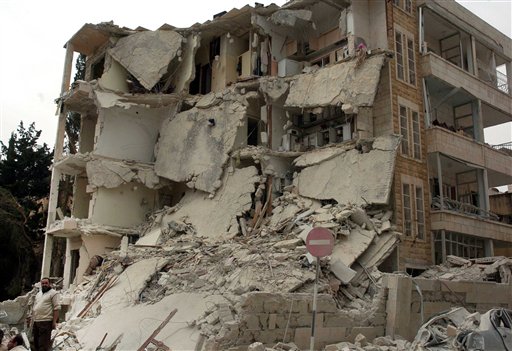By KARIN LAUB
Associated Press
BEIRUT
Two suicide bombers blew up cars rigged with explosives near a military compound and a hotel in northwestern Syria on Monday, killing at least nine people and wounding nearly 100, state media said.
The powerful blasts, which tore two craters into the ground and ripped the facade off a multistory building, marked the latest setback for troubled United Nations efforts to end Syria’s 13-month-old crisis.
An April 12 cease-fire agreement has helped reduce violence, but fighting persists and U.N. officials have singled out the Syrian regime as the main aggressor. An advance team of 16 U.N. observers is on the ground to try to salvage the truce, which is part of a broader plan by special envoy Kofi Annan to launch talks between President Bashar Assad and his opponents.
The head of the observer mission, Maj. Gen. Robert Mood, said Monday that his force cannot solve the country’s crisis, and he urged both sides to stop fighting.
Currently, 16 observers are on the ground. By mid-May, the team is to grow to 100, but U.N. officials have not said by when a full 300-member contingent is to be deployed.
Monday’s bombs went off in the city of Idlib, an opposition stronghold that government troops recaptured in a military offensive earlier this year.
The state-run news agency SANA said security forces and civilians were among those killed, while state TV said that many of the nearly 100 wounded were civilians. The Britain-based Syrian Observatory for Human Rights, an activist network, put the death toll at more than 20 people.
Syria’s pro-government al-Ekhbariya TV aired footage of the aftermath from the blasts, showing torn flesh, smashed cars, twisted debris and pavement stained with blood. The force of the explosions shattered windows in the area and sent debris flying for hundreds of meters (yards). Pro-government websites said five buildings were damaged.
There was no immediate claim of responsibility for the attacks. State media blamed “armed terrorists,” a term it uses for rebels trying to topple the government. Activists claimed the regime was behind the bombings to discredit the opposition.
The bombers detonated their explosives near a military compound and near the city’s Carlton Hotel, SANA said.
A local activist, who only gave his first name, Ibrahim, for fear of repercussions, said the two sites are several hundred meters apart and that the explosions went off within five minutes of each other after daybreak Monday.
Two members of the U.N. observer team toured the site of the bombings, SANA said. Ibrahim said the observers have been staying at the Carlton, and a pro-government website reported that the hotel sustained some damage.
Monday’s bombings were the latest in a series of suicide bombings to hit Syria.
An al-Qaida-inspired Islamist group called the Al-Nusra Front to Protect the Levant claimed responsibility Monday for a suicide bombing in downtown Damascus that killed at least 10 people on Friday. The Associated Press could not verify the authenticity of Al-Nusra’s statement which was posted on a militant website.
Earlier Monday, gunmen fired rocket-propelled grenades at the central bank and a police patrol in the capital of Damascus, wounding four officers, SANA said.
The bank’s governor, Adib Mayaleh, said the only damage to the bank was shattered windows.
He also denied reports that Syria is trying to sell gold reserves to raise funds as international sanctions take their toll. French Foreign Minister Alain Juppe said earlier this month that said sanctions have reduced Syria’s foreign currency reserves by half, from an estimated $17 billion at the start of the uprising.
The bank doesn’t need to sell gold “as we have a big quantity of hard currency that can stand up to all those attacks,” Mayaleh said. He said Syria’s hard currency reserves are sufficient to meet the country’s needs.
Near Damascus, amateur video posted Monday showed dozens of uniformed troops in helmets and body armor marching through a street in the suburb of Douma. A local activist, Mohammed Saeed, said the troops were carrying out arrests for a second day Monday.
In another suburb, Zamalka, activists said security forces tried to break a commercial strike by damaging shops that had been closed in solidarity with the protest. An amateur video showed rows of shuttered stores. Another showed dozens of men marching in Zamalka, chanting “strike, strike.”
As part of the cease-fire agreement, Syria’s military was to have pulled tanks and troops off the streets, but has instead continued to raid and attack opposition strongholds.
In London, British Foreign Secretary William Hague warned that “there is a limit to the patience of the international community” with the regime’s continued truce violations.
However, Western powers have limited options because Russia and China, Syria’s allies, have shielded Assad from U.N. Security Council action. Hague said more truce monitors must be sent to Syria to improve the situation and that Britain is increasing its non-lethal support for the opposition.
Also Monday, a Lebanese security official said a Lebanese man, Antoine Hajj, was shot in the shoulder in the remote al-Yabseh area near the Syrian border. The official said the bullet came from the Syrian side. Hajj was in stable condition. It was not clear what caused the gunfire from the Syrian side.
___
Associated Press writer Albert Aji in Damascus and Zeina Karam in Beirut contributed reporting.

COMMENTS
Please let us know if you're having issues with commenting.